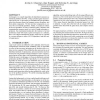Free Online Productivity Tools
i2Speak
i2Symbol
i2OCR
iTex2Img
iWeb2Print
iWeb2Shot
i2Type
iPdf2Split
iPdf2Merge
i2Bopomofo
i2Arabic
i2Style
i2Image
i2PDF
iLatex2Rtf
Sci2ools
152
click to vote
AAMAS
2011
Springer
2011
Springer
Benchmarking hybrid algorithms for distributed constraint optimisation games
In this paper, we consider algorithms for distributed constraint optimisation problems (DCOPs). Using a potential game characterisation of DCOPs, we decompose six distributed DCOP algorithms, taken from the game theory and computer science literatures, into their salient components. We then use these components to construct five novel hybrid algorithms. Finally, we empirical evaluate all eleven algorithms, in terms of solution quality, timeliness and communication resourses used, in a series of graph colouring experiments. Our experimental results show the existence of several performance trade–offs (such as quick convergence to a solution, but a cost of high communication needs), which may be exploited by a system designer to tailor a DCOP algorithm to suit their mix of requirements.
Related Content
| Added | 12 May 2011 |
| Updated | 12 May 2011 |
| Type | Journal |
| Year | 2011 |
| Where | AAMAS |
| Authors | Archie C. Chapman, Alex Rogers, Nicholas R. Jennings |
Comments (0)

